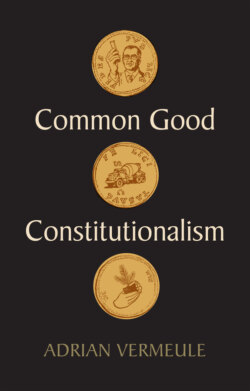Читать книгу Common Good Constitutionalism - Adrian Vermeule - Страница 11
The Common Good Defined
ОглавлениеChapter 1 defines the common good, at successively specific levels – conceptually, legally, and constitutionally. In brief, the common good is, for the purposes of the constitutional lawyer, the flourishing of a well-ordered political community. The common good is unitary and indivisible, not an aggregation of individual utilities. In its temporal aspect it represents the highest felicity or happiness of the whole political community, which is also the highest good of the individuals comprising that community.
To give this more specific content, I look to the precepts of legal justice in the classical law – to live honorably, to harm no one, and to give each one what is due to him in justice – and to the related ragion di stato tradition in early modern Europe, which articulates the central goods at which constitutionalism should aim. These goods include, in a famous trinity, peace, justice, and abundance, which I extrapolate to modern conditions to include various forms of health, safety, and economic security. I also elicit from the tradition the key principles of solidarity and subsidiarity.18
The largest point of the tradition is that public authority is both natural and legitimate – rather than intrinsically suspect, as one might infer from certain strands of the liberal tradition. Yet that authoritative rule is bounded and limited by the very condition that gives it legitimacy: that the ruling authority always act through reasoned ordinances conducing to the common good, to public rather than private interest. As we will see, the requirement of reasoned and public-regarding rule leaves ample scope to adjust the law to changing circumstances, but the fundamental nature of law as reasoned ordination to the common good is unchanging.
Common good constitutionalism, then, is not legal positivism, meaning that it does not identify all law with the rules laid down by those authorized to do so by social conventions; on the contrary, it allows that the truth of legal propositions sometimes depends on the truth of moral propositions. Common good constitutionalism draws upon an immemorial tradition that includes, in addition to positive law, sources such as the general law common to all civilized legal systems (ius gentium) and principles of objective natural morality (ius naturale), including procedural legal morality in the sense used by the American legal theorist Lon Fuller: the inner logic that the activity of law should follow in order to function well as law.19
Here it is easy to misunderstand the place of positive law in the classical tradition. Positive law is hardly lacking; it represents a legitimate specification by the public authority of general principles of legal morality that need concrete embodiment, the specification of local rules that take account of local conditions, and is therefore called ius civile, literally the “law of the city.” Indeed, as we will see, the right and duty of the public authority to determine or specify the content of the positive law imply that the judges or other officials who determine the meaning of law at the point of application are duty-bound to follow a kind of textualism, at least presumptively. But this is not the positivist form of textualism that simply equates law with positive enacted texts; rather it is textualism justified by reference to political morality, the rational ordering of rules to the common good by the public authority. Thus positive enacted texts are always read against the backdrop of, and if at all possible in accord with, the broader legal background of natural law, general and traditional legal principles, and the law of nations. The classical law incorporates positive law, but rejects any commitment to positivism in a jurisprudential sense, regardless of any distinctions between harder or softer, exclusive or inclusive versions of positivism. (As explained later, I follow Dworkin in believing that inclusive versions of positivism and originalism converge entirely with non-positivism and non-originalism; they are essentially ways of saving face at the level of names and labels while abandoning all the important substantive positions.)
